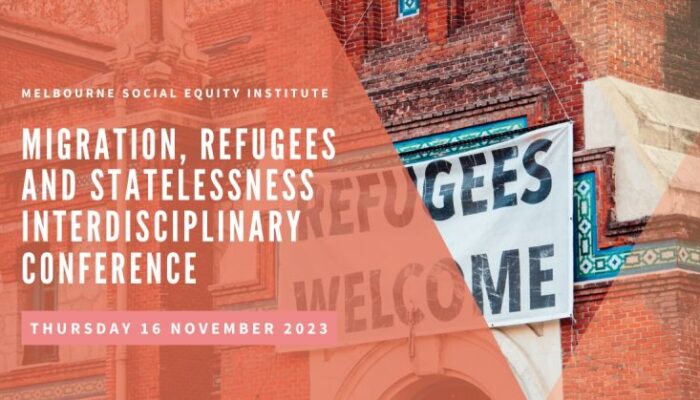Migration, Refugees and Statelessness Interdisciplinary Conference November 2023 University of Melbourne
Organised and hosted by the Melbourne Social Equity Institute, the annual Migration, Refugees and Statelessness Interdisciplinary Conference showcases the work of refugee and migration scholars throughout Australia. This one-day event was held in November 2023 at the University of Melbourne. The day was organised into four sessions: 1) Borders, identity and belonging. 2)Research, reflexivity and racialised migration. 3) Education, health and wellbeing. 4) Statelessness, settlement and services. Over 40 scholars presented research that encompassed wide-ranging topics. The program covered a breadth of current research into migration issues along with emerging research trends and issues. Read the program and abstracts here.
The conference platformed the importance of researcher lived experience. A striking change from previous conferences was that many researchers who presented were themselves from diverse backgrounds including migrants, refugees, and people from asylum seeker backgrounds. Some presenters challenged traditional research practices and highlighted the negative impact of colonisation in research and policy.
A recurring theme at the conference was the importance of respecting the voices of participants. Several presenters used the actual voices of participants in their presentations. Dr Cadla O’Sullivan showed the drawings of young refugee children to give a children’s perspective on their lives and their feelings about being at school and the hardships they faced. A range of research methods were used in the research. Several researchers outlined their use of participatory action research where participants play an active part in all aspects of the research process. They described how they are actively co-creating research with their participants and aiming to equalise the power imbalances between the researcher and their participants.
Doctoral student Mireille Kayeye shared that having a lived experience of seeking asylum can also entail emotional risks to the researcher. She revealed a completely unexpected reaction when she became upset when reviewing transcripts of the participants, she had interviewed for her research who, like her, were from an asylum seeker background. She worried and dreamt about the women she had interviewed. Her institution had not prepared her for the possibility of vicarious trauma and her colleagues mistakenly thought her stressed reaction was a normal PhD response to doctoral study. Mireille described strategies to deal with triggering research such as debriefing, counselling, and mindfulness. In response to her presentation, several audience members suggested the need to join a network of forced migration scholars to support researchers in the field.
Seven young women who recently arrived from Afghanistan and now studying at university in Melbourne made heartfelt and poignant presentations about their experiences of being forced to leave study in Afghanistan. They shared their hopes and dreams despite an uncertain future ahead of them. They expressed worry about whether they could ever return to Afghanistan. All had been studying at university when the Taliban took over Afghanistan and were forced to immediately stop their studies. They were awarded student visas and scholarships and travelled to Melbourne to first study English and then move into further studies at the University of Melbourne. One young woman shared her dilemma that while studying in Australia offered amazing opportunities:
Our studies will not make us welcome in our homeland. I still do not have a clear fate. I do not know what to expect. I worry about my future. Will they let me work? My future is precarious, uncertain. We have begun to sense a new kind of precariousness, one that has shifted from the precariousness of access to education to the precariousness of potential statelessness. We ask you not to forget the Afghani women and girls.
Another powerful theme was in relation to representation. Danijel Malbasa, a former Yugoslav refugee and now an advocate, writer and lawyer emphasised the importance of lived experience in representing and giving agency to forced migrants, including attendance at international forums on forced migration. He stressed the need to shift representation away from a vulnerability trope to one of capability and recognition that immigrants and refugees bring skills and aspirations to their receiving countries. One audience member countered that the refugee experience is diverse, and one refugee may not be able to express the needs of all refugees.
Researchers from the Monash Centre for Occupational and Environmental Health presented three research projects centred around occupational health and safety issues amongst workers from migrant backgrounds. One ground-breaking project was conducted investigating stone benchtop workers exposed to silica, a very fine dust that sits in the lungs, causing fatal lung diseases including silicosis and lung cancer. As a result of their research and advocacy Australia will now ban engineered stone benchtops with crystalline silica from 1 July 2024 thus saving the lives of many tradespeople. The impact of their research is a compelling example of the power of research and advocacy.
This conference enabled a mix of established, transdisciplinary, emerging scholars and doctoral students to share state-of-the-art practices and insights with each other. The conference was also an opportunity to meet other scholars, share ideas and engage in lively discussion during the breaks. As Danijel Malbasa observed, ‘we live in an age of displacement’. In our current uncertain times, researchers have never played a more vital role in investigating ways to assist those forced to leave their home countries to settle into safer havens.
